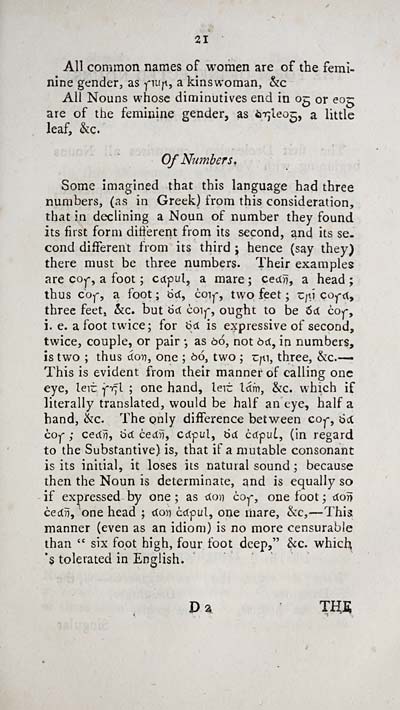Download files
Complete book:
Individual page:
Thumbnail gallery: Grid view | List view

21
All common names of women are of the femi-
nine gender, as yui/i, a kinswoman, &c
All Nouns whose diminutives end in 05 or eog
are of the feminine gender, as irrjleog, a little
leaf, &c.
Of Numbers,
Some imagined that this language had three
numbers, (as in Greek) from this consideration,
that in declining a Noun of number they found
its first form different from its second, and its se-
cond different from its third j hence (say they)
there must be three numbers. Their examples
are coy, a foot ; cdpul, a mare ; ced»), a head ;
thus coy, a foot ; bet, coiy, two feet ; zjú coyd,
three feet, &c. but bet coiy, ought to be Oct coy,
i. e. a foot twice; for bet is expressive of second,
twice, couple, or pair •, as 00, not óct, in numbers,
is two ; thus do»), one ; £>ó, two ; tjti, three, &c—
This is evident from their manner of calling one
eye, leii yVjl ; one hand, leit Idm, &c. which if
literally translated, would be half an eye, half a
hand, &c. The only difference between coy, bd
coy ; cedr), óú ced»}, cdpul, bd cdpui., (in regard
to the Substantive) is, that if a mutable consonant
is its initial, it loses its natural sound ; because
then the Noun is determinate, and is equally so
if expressed by one ; as dom coy, one foot ; don
cedrl, one head ; do» cdpul, one mare, &c, — This;
manner (even as an idiom) is no more censurable
than tc six foot high, four foot deep," &c. which
*s tolerated in English.
Da THK
All common names of women are of the femi-
nine gender, as yui/i, a kinswoman, &c
All Nouns whose diminutives end in 05 or eog
are of the feminine gender, as irrjleog, a little
leaf, &c.
Of Numbers,
Some imagined that this language had three
numbers, (as in Greek) from this consideration,
that in declining a Noun of number they found
its first form different from its second, and its se-
cond different from its third j hence (say they)
there must be three numbers. Their examples
are coy, a foot ; cdpul, a mare ; ced»), a head ;
thus coy, a foot ; bet, coiy, two feet ; zjú coyd,
three feet, &c. but bet coiy, ought to be Oct coy,
i. e. a foot twice; for bet is expressive of second,
twice, couple, or pair •, as 00, not óct, in numbers,
is two ; thus do»), one ; £>ó, two ; tjti, three, &c—
This is evident from their manner of calling one
eye, leii yVjl ; one hand, leit Idm, &c. which if
literally translated, would be half an eye, half a
hand, &c. The only difference between coy, bd
coy ; cedr), óú ced»}, cdpul, bd cdpui., (in regard
to the Substantive) is, that if a mutable consonant
is its initial, it loses its natural sound ; because
then the Noun is determinate, and is equally so
if expressed by one ; as dom coy, one foot ; don
cedrl, one head ; do» cdpul, one mare, &c, — This;
manner (even as an idiom) is no more censurable
than tc six foot high, four foot deep," &c. which
*s tolerated in English.
Da THK
Set display mode to: Large image | Transcription
Images and transcriptions on this page, including medium image downloads, may be used under the Creative Commons Attribution 4.0 International Licence unless otherwise stated. ![]()
| Early Gaelic Book Collections > Hew Morrison Collection > Practical grammar of the Irish language > (35) |
|---|
| Permanent URL | https://digital.nls.uk/76734563 |
|---|
| Description | A selection of items from a collection of 320 volumes and 30 pamphlets of literary and religious works in Scottish Gaelic. From the personal library of Hew Morrison, the first City Librarian of Edinburgh. |
|---|
| Description | Selected items from five 'Special and Named Printed Collections'. Includes books in Gaelic and other Celtic languages, works about the Gaels, their languages, literature, culture and history. |
|---|

